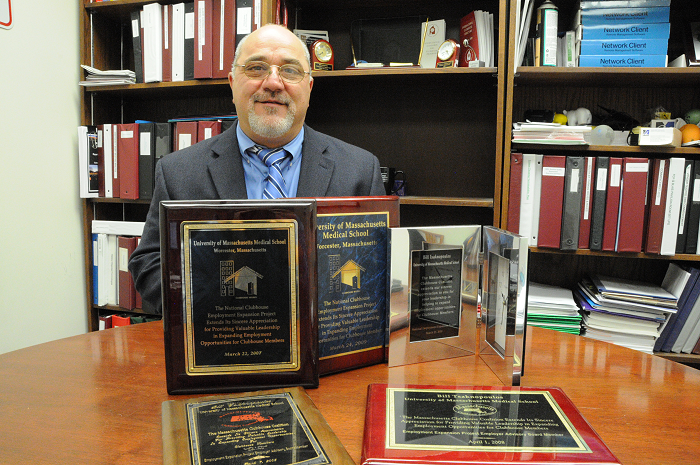
Bill Tsaknopoulos, pictured here with a few of the numerous awards UMMS has received for its employment partnership with Genesis Club, has established transitional employment slots in Auxiliary Services, and encourages other UMMS departments to get involved.
The ability to earn a living is a major life goal for most adults, including those who, like Jack Grillo, live with major mental illnesses. “My steps to recovery from bipolar disorder can be retraced in terms of work,” Grillo wrote in the October 2009 issue of Psychiatric Services, a journal of the American Psychiatric Association. Now employed part-time at UMass Medical School’s Center for Mental Health Services Research, Grillo credits the transitional employment (TE) program of Worcester’s Genesis Club with helping him achieve his employment goals.
Since 1988, the Genesis Club has supported a robust employment program for its members, who boast a 47 percent employment rate, as compared to the national average of 8 percent for adults with mental illness. And for nearly as long, UMass Medical School has been providing transitional, supported and independent employment opportunities in partnership with Genesis Club.
“What the Medical School tries to do is help them redevelop social skills and become part of a team, and give them the opportunity to come back into the world and the workforce,” said Bill Tsaknopoulos, director of auxiliary services and a longtime champion of the partnership at UMMS. “We have people with all sorts of disabilities working here. Our goal for them is the same: help them be successful.” Since creating two positions in the mailroom in 1996, Tsaknopoulos has established ten dedicated TE slots that turn over every six to nine months. With these, along with a number of positions in other departments, UMMS has provided placements to more than 300 Genesis Club members.
A charter member and certified training center of the International Center for Clubhouse Development (ICCD) and a founding member of the Massachusetts Clubhouse Coalition (MCC), the Genesis Club is an exemplar of the international clubhouse movement, in which members in recovery from mental illness are supported as they pursue opportunities for education, housing, wellness, meaningful friendships—and, whenever possible, employment. Genesis Club operates its employment program in accordance with the guidelines of the ICCD.
Transitional employment—a temporary, part-time job arranged between the employer and Genesis Club without the requirement of an interview and closely supervised by both Genesis Club staff and the employer—is the first of three levels of employment that ease individuals into the working world. The next level, achieved by Jack Grillo after his involvement in transitional employment, is supported employment (SE), lasting any length of time, in which the employee still receives support from the Genesis Club. The final level, and the ultimate goal, is independent employment, in which the individual interviews for and holds a job without clubhouse assistance.
A TE or SE opportunity at UMMS can be a life-changing experience for clubhouse members. “It feels good to have plans for the future again. It feels good to want to try again,” said Genesis member and UMMS transitional employee John Bridges.
Along with Deputy Chancellor for Commonwealth Medicine Thomas D. Manning, a founding director of the Genesis Club who established the first TE placement at UMMS in 1990, Tsaknopoulos has been called upon to speak about being a clubhouse TE employer at national conferences. Also a member of the Genesis Club’s Board of Directors and the Massachusetts Clubhouse Coalition, Tsaknopoulos has accepted numerous local and regional awards on behalf of UMMS for its longstanding, successful employment partnership with Genesis Club. At an event organized by MCC in Washington, DC, in 2009, Manning and Tsaknopoulos were recognized by Massachusetts U.S. Reps. James McGovern and Barney Frank for leadership in promoting the hiring of adults with psychiatric disabilities.
Not content to rest on his laurels, Tsaknopoulos continues to strengthen and build the UMMS/Genesis Club partnership. “Our managers work closely with the clubhouse to make sure individuals coming in are ready for this next step in their recovery process,” he said. “Once they have been successful in a TE position, we can begin to teach them skills and knowledge that qualify them for jobs outside the Medical School.” Tsaknopoulos encourages UMMS managers who are interested in learning about how transitional employment can help meet their departments’ workforce needs to contact him directly. “Even a temporary opening can help. If we can give someone 10 weeks of work, they’ll leave with 10 more than they had previously and get something out of it.”
Related links:
UMMS community members run for Team Genesis
Using art to triumph over mental illness
The Genesis Club
Share this story